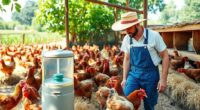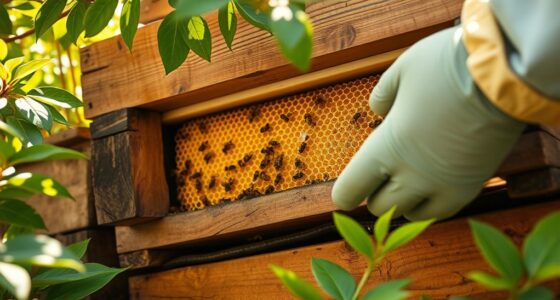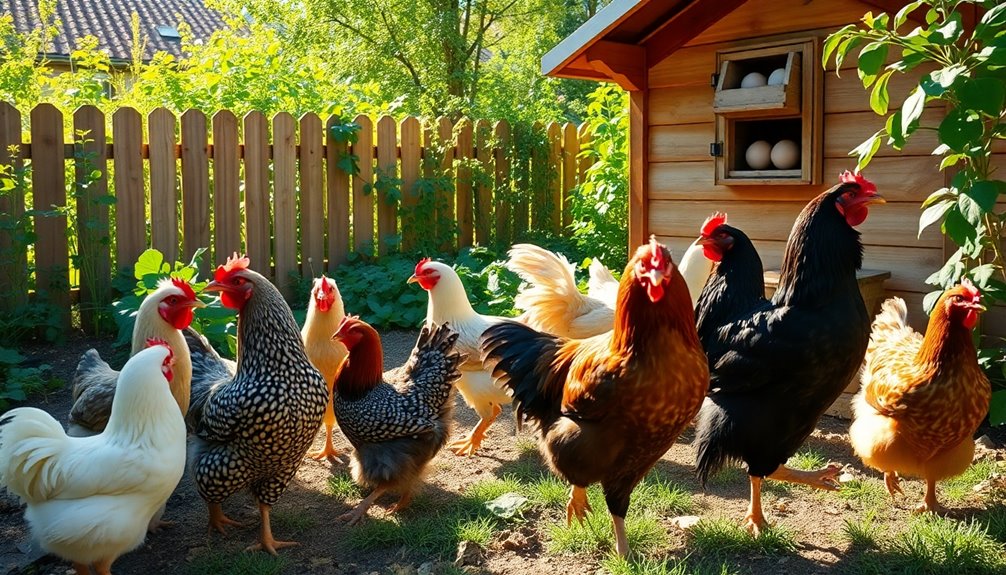To care for pregnant goats, start by monitoring early signs of pregnancy using methods like ultrasound and blood tests. Ensure your does get proper nutrition throughout each pregnancy stage, especially during late pregnancy when energy demands increase. Keep an eye on their health with regular checks and vaccinations, and address any complications swiftly. Providing a safe and comfortable shelter is essential for both the doe and her kids. There's more you can do to ensure their well-being.
Key Takeaways
- Monitor does for behavioral changes, such as increased appetite and decreased milk production, as indicators of pregnancy.
- Conduct regular health checks, including vaccinations and parasite control, to ensure maternal and fetal well-being.
- Utilize transrectal or transabdominal ultrasonography to confirm pregnancy and estimate kidding dates accurately.
- Adjust nutrition during late pregnancy to meet increased energy demands and ensure access to essential minerals.
- Maintain a clean environment and monitor closely for complications, providing timely veterinary intervention when necessary.
Methods for Detecting Pregnancy in Goats
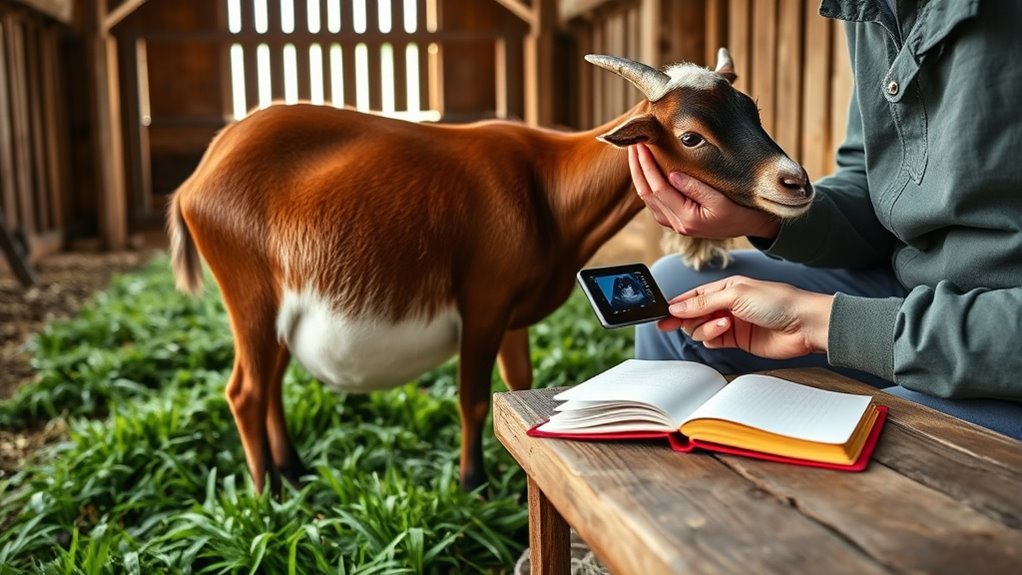
How can you accurately detect pregnancy in goats? You've got several methods at your disposal.
Transrectal ultrasonography can diagnose pregnancy as early as 20 days, while transabdominal ultrasonography is more reliable after 30 days.
Look for a failure to return to heat; it's a common sign but not definitive. Blood tests for Pregnancy-Associated Glycoproteins (PAGs) can confirm pregnancy as early as 21 days post-breeding.
A failure to return to heat may indicate pregnancy, but blood tests for PAGs provide a more definitive confirmation as early as 21 days post-breeding.
Also, keep an eye on behavioral changes—an increase in appetite or decreased milk production can signal pregnancy.
Lastly, advanced techniques like radiography offer 100% accuracy after day 70, confirming the number of kids you can expect.
Monitoring these signs will help you manage your goats effectively during this crucial time.
Understanding Gestation Period and Influencing Factors
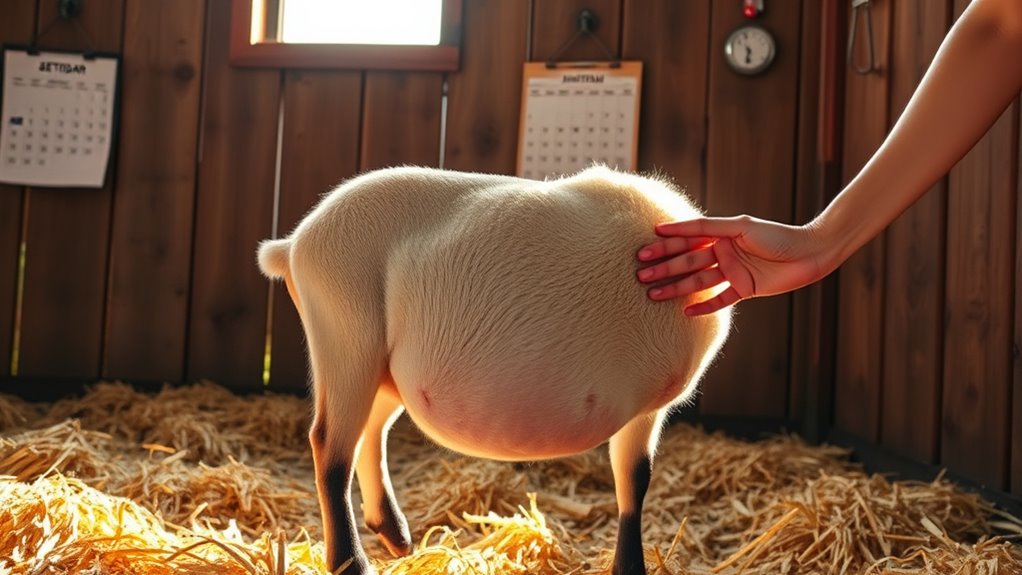
Detecting pregnancy in goats sets the stage for understanding the gestation period and the factors that can influence it.
The typical gestation lasts about 145 to 150 days, with standard breeds averaging 150 days and miniature breeds around 145 days. Breed size plays a role—smaller breeds usually have shorter gestation periods.
Environmental conditions, like extreme temperatures and stress, can also impact the pregnancy duration. Keep in mind that larger litters may result in slightly shorter gestation.
Maintaining detailed records of breeding dates helps you estimate kidding dates accurately using goat gestation calculators. Proper health care and monitoring throughout this period are essential for a healthy pregnancy, ensuring both you and your goats are prepared for the upcoming kids.
Nutritional Needs During Pregnancy
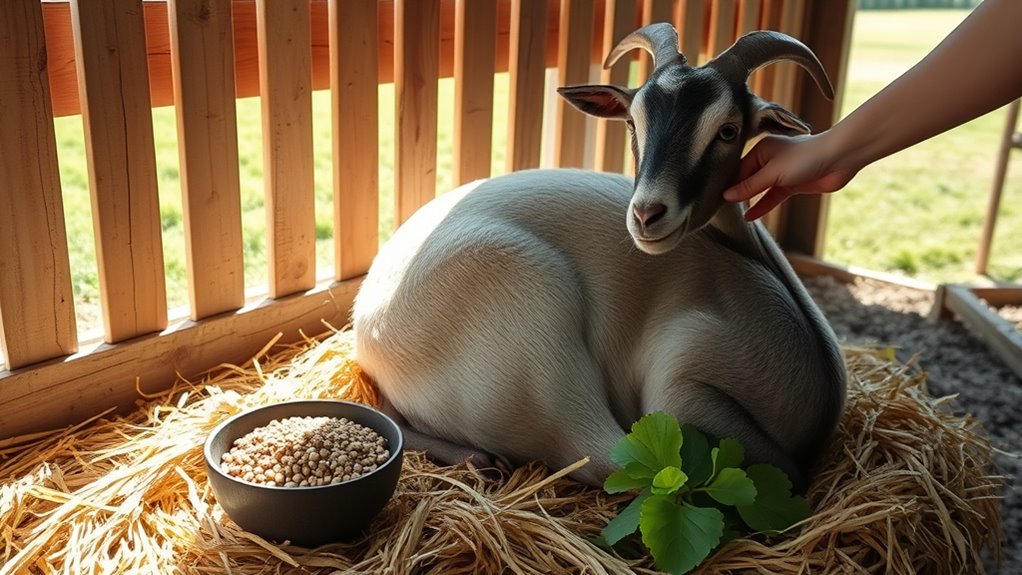
As you prepare for the arrival of new kids, understanding the nutritional needs during pregnancy is crucial for your goats' health.
In early pregnancy, maintain their body condition with similar nutrition levels. As you move into mid-pregnancy, average-quality forages suffice. However, late pregnancy demands increased energy and nutrients due to rapid fetal growth. If your does are expecting multiple kids, their nutritional needs rise even more.
Ensure they've access to fresh water, quality forages, and consider introducing concentrates gradually.
Pay attention to essential minerals like calcium, phosphorus, and selenium for fetal development and immune support. Monitor body condition scores to keep them within 3 to 4, preventing issues like pregnancy toxemia and ensuring healthy kids at birth.
Health Monitoring and Preventive Care
Monitoring the health of your pregnant goats is essential to ensure both their well-being and the successful delivery of healthy kids. Use techniques like ultrasound scanning, which can confirm pregnancy as early as 30 days, while the estrone sulfate test effectively detects pregnancy by measuring hormone levels.
Keep your does up-to-date on vaccinations and control parasites to prevent health issues. Regularly observe your goats for signs of illness and monitor their body condition, temperature, and living conditions.
Implement biosecurity measures and isolate new animals to minimize infection risks. By maintaining proper hygiene and sanitation, you'll create a healthy environment that supports your goats throughout their pregnancy.
Managing Pregnancy Complications and Risks
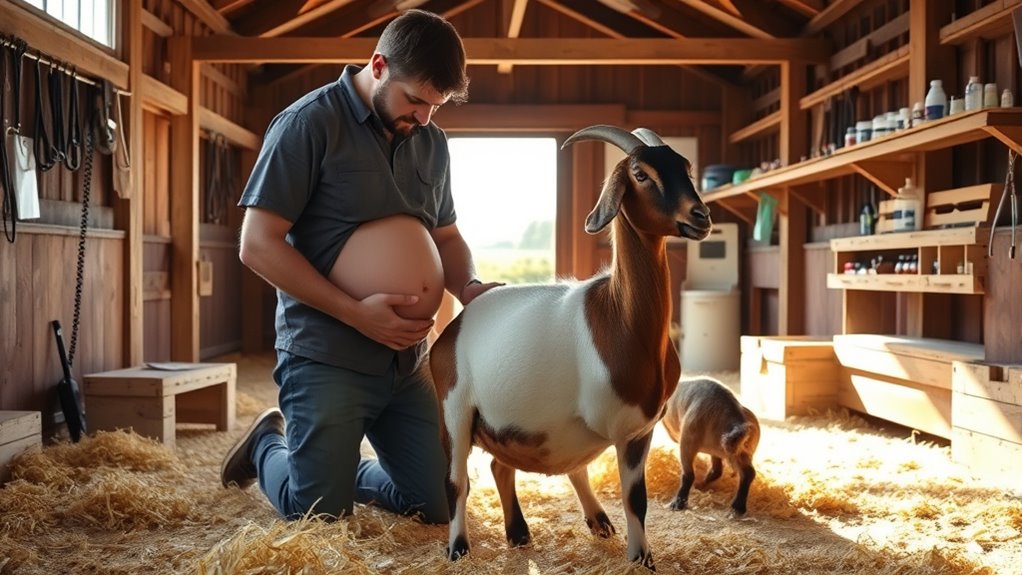
Pregnancy in goats can present various complications and risks that require your attention to ensure a smooth process.
Dystocia, for example, can lead to severe issues such as uterine tears and retained fetal membranes. If you notice signs of distress in your goat, call a veterinarian immediately, as prompt intervention is crucial.
Be mindful of pregnancy toxemia, especially in does carrying multiple fetuses or with poor body condition. Regularly monitor their appetite and body condition, and adjust their diet to prevent ketosis.
Keeping an eye out for symptoms of metritis and other periparturient complications will help you manage these risks effectively. Always consult a vet for guidance on any dietary changes or complications you observe.
Preparing for Kidding: Essential Steps
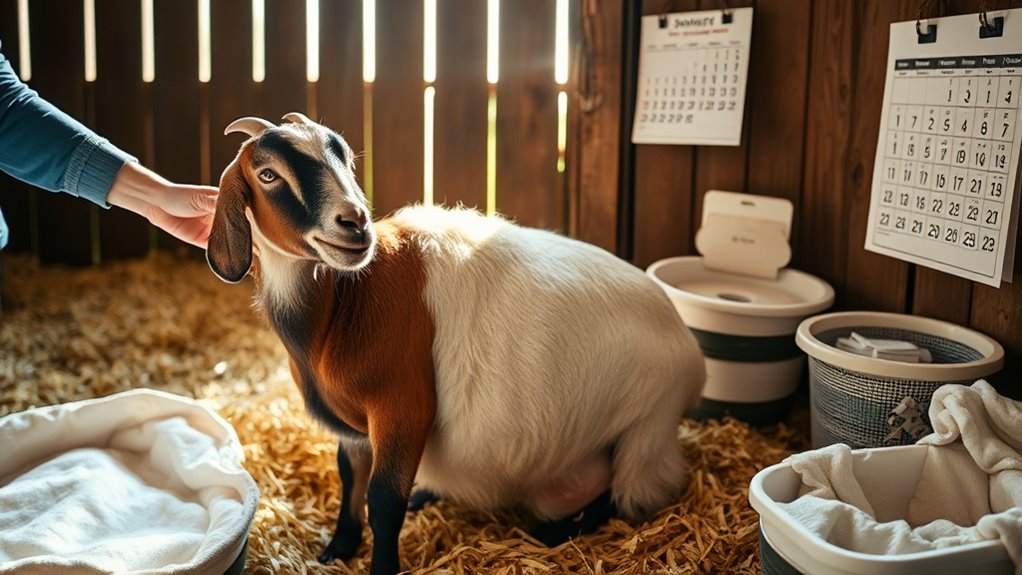
Preparing for kidding requires careful planning and attention to detail to ensure both the doe and her kids have a safe experience. Start by thoroughly cleaning and disinfecting the facilities to minimize any health risks.
Set up individual kidding pens for each doe to reduce stress during labor. Check that heat lamps are functioning and provide proper ventilation. Ensure pastures have been un-grazed for at least 60 days to limit parasite exposure.
Prepare a kidding kit with essentials like latex gloves, iodine, and towels. Monitor does closely for signs of labor and have emergency contacts readily available.
Lastly, maintain a nutritious diet with high-quality hay and fresh water to support your doe's health leading up to kidding.
Importance of Shelter and Environment
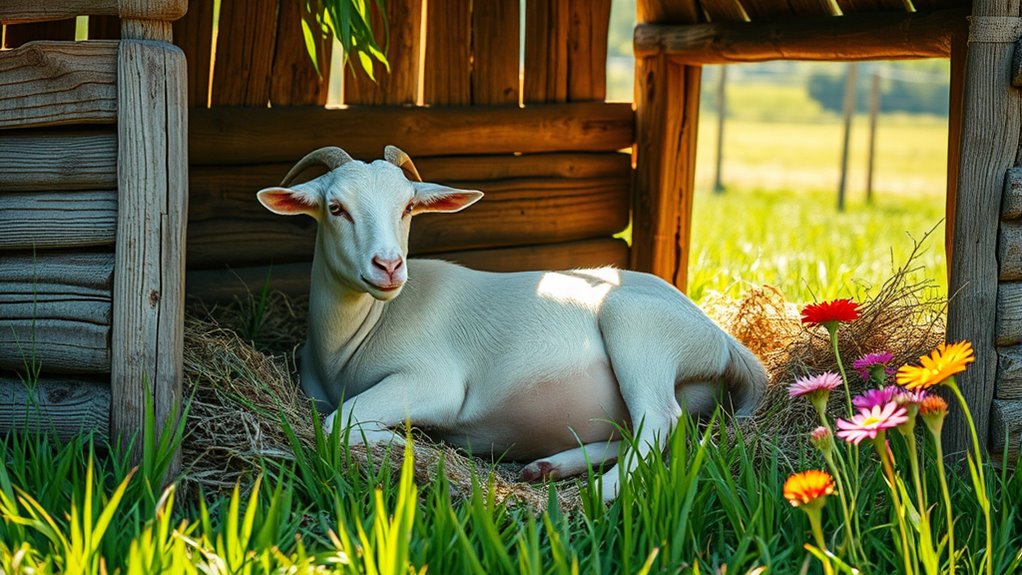
Creating a safe and comfortable environment is vital for the health and well-being of your goats, particularly during pregnancy and kidding. Proper shelter protects them from harsh weather, predators, and reduces stress.
Creating a secure and cozy environment is essential for your goats' health, especially during pregnancy and kidding.
You should consider three-sided shelters for milder climates or fully enclosed barns in colder areas. Ensure your shelter is well-ventilated to prevent ammonia buildup and maintain good hygiene through regular cleaning.
Make sure there's plenty of space to avoid overcrowding, allowing your goats to rest comfortably. During pregnancy, private stalls can help reduce stress, and providing a companion goat can further ease anxiety.
Lastly, prepare the shelter in advance for kidding, ensuring it's equipped for the safety of both does and kids.
Effective Vaccination and Parasite Control

To ensure the health of your pregnant goats, implementing effective vaccination and parasite control measures is crucial.
Vaccinate mature does with CDT and tetanus in the last month of pregnancy, and don't forget annual boosters 30 days before kidding. For kids, start vaccination at 1-2 months of age, with booster shots every 3-4 weeks.
Regular deworming is essential, beginning at 12 weeks old, and consult your veterinarian for a tailored deworming schedule.
While selenium supplementation is vital in deficient areas, avoid giving Bo-Se to pregnant does due to abortion risks.
Regularly monitor for parasites to prevent health issues, ensuring a healthy environment for both does and their kids.
Weight Management for Pregnant Does
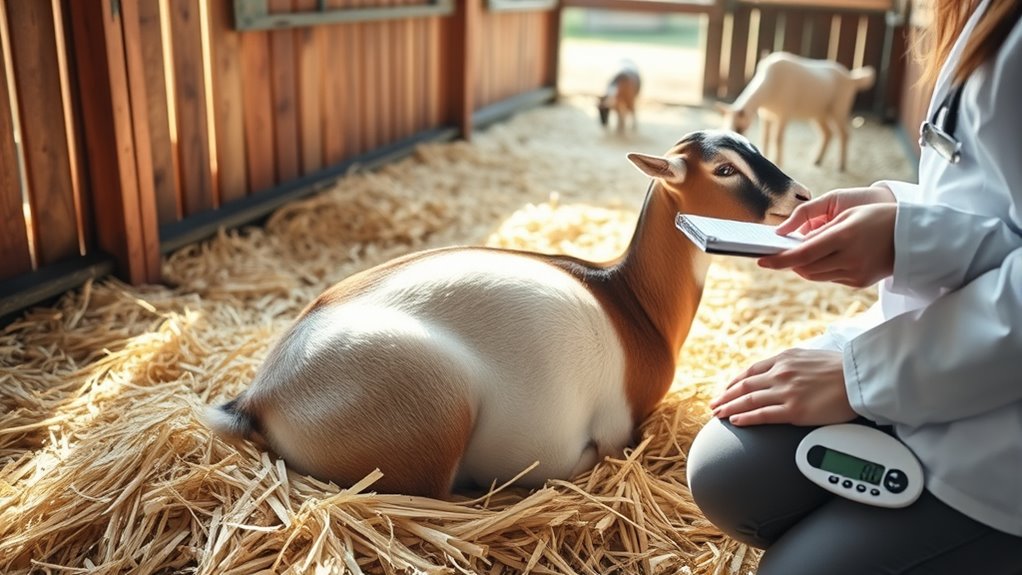
Managing the weight of pregnant does is essential for their health and the successful outcome of their pregnancies. Aim for a body condition score (BCS) between 2.5 and 4.0, as this promotes easier conception and reduces the risk of complications like pregnancy toxemia.
Monitor their weight closely; does should gain 15 to 40 pounds in late gestation. To meet increasing nutritional needs, provide a dry matter intake of 1.3 to 1.6 pounds daily, focusing on quality energy and protein sources. Incorporate moderate exercise to maintain fitness and support a healthy pregnancy.
Lastly, consider separating late-pregnant does from the flock to ensure they receive proper nutrition without competition. This proactive approach can help prevent health issues and ensure a smooth pregnancy.
Post-Kidding Care and Considerations
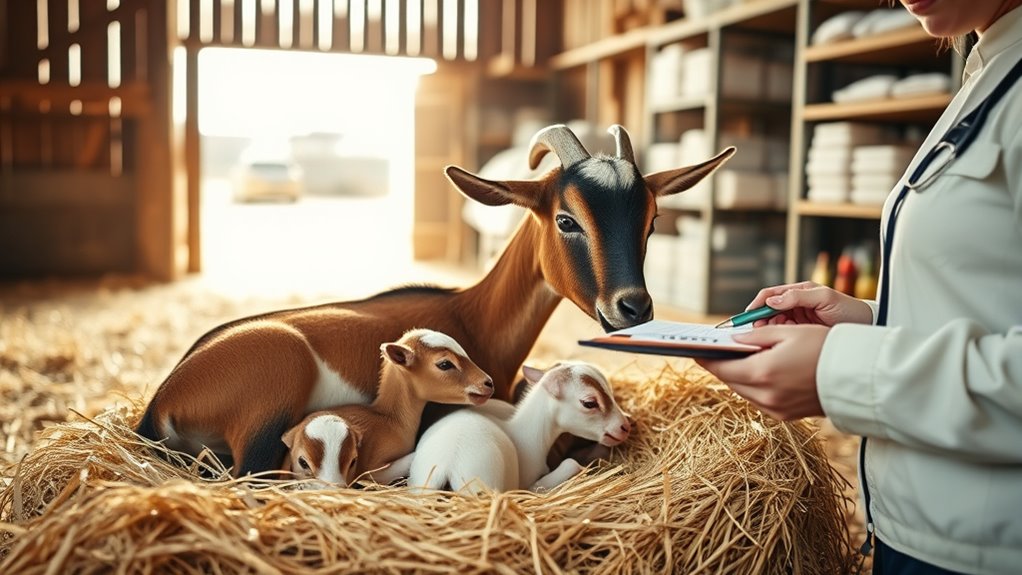
As soon as your doe has kidded, providing proper post-kidding care is crucial for her recovery and the health of her kids.
Start by offering high-quality forage, like alfalfa hay, to support her lactation. Supplement her diet with high-fat and protein products, and ensure she's access to free-choice minerals, especially calcium.
Offer high-quality forage, like alfalfa hay, and supplement with high-fat products and free-choice minerals for optimal lactation support.
Keep her hydrated with fresh water enriched with electrolytes. Monitor her health closely; deworm and vaccinate as needed, and don't forget to care for the umbilical cords.
Maintain a clean, secure environment for bonding and protection from predators. Allow adequate recovery time before reintroducing her to the herd, and check kids regularly for any signs of distress or illness.
Frequently Asked Questions
How Can I Tell if My Goat Is in Labor?
To tell if your goat is in labor, watch for key signs. Look for restlessness and nesting behavior as she prepares her area.
You might notice her udder filling with milk and a white discharge appearing. As labor progresses, she'll experience contractions, vocalize more, and begin pushing.
Check for swelling of the vulva and softening of tail ligaments. Stay observant; these signs indicate she's getting closer to delivering her kids.
What Signs Indicate Pregnancy Complications in Goats?
You'll want to watch for several signs that indicate pregnancy complications in goats.
Look for anorexia, lethargy, and recumbency, as these suggest distress. A sweetish, fruity odor on their breath may signal ketosis.
During labor, signs like prolonged labor or abnormal presentations can indicate trouble. If you notice restlessness or any bleeding, it's crucial to seek veterinary help immediately to ensure the health of both the doe and her kids.
Can Goats Experience False Pregnancies?
Yes, goats can experience false pregnancies, often termed pseudopregnancy.
You might notice signs like abdominal distention, udder enlargement, and even spurious lactation. These symptoms mimic actual pregnancy but occur without a viable fetus.
Factors such as hormonal imbalances, exposure to certain substances, or breeding out of season can contribute to this condition.
If you suspect a false pregnancy, it's crucial to consult a veterinarian for proper diagnosis and treatment options.
How Often Should I Check My Pregnant Goats?
You should check your pregnant goats at least once a day, but twice daily in the later stages of pregnancy. This ensures you catch any signs of distress early.
Interestingly, about 70% of complications arise in the last few weeks, making frequent observations crucial. Pay attention to their behavior and physical changes; these can indicate when they're close to kidding, allowing you to provide the necessary support and care.
What Should I Do if a Goat Refuses to Eat During Pregnancy?
If a goat refuses to eat during pregnancy, first assess her environment for stressors.
Check her body condition and look for signs of illness.
Offer high-quality hay and ensure she's access to fresh water.
You might consider consulting a vet to rule out any underlying health issues.
If she continues to refuse food, monitor her closely for other symptoms, as prompt action may be necessary to safeguard her health and the kids.
Conclusion
In conclusion, caring for pregnant goats requires your attentive eye and nurturing spirit. By understanding their needs—from nutrition to health monitoring—you'll help ensure a smooth journey to motherhood. Just as a gardener tends to each seedling, your dedication will foster a thriving environment for both does and their kids. Remember, proactive management today leads to a healthier herd tomorrow, so stay vigilant and compassionate throughout this vital period. Your goats will thank you with their vibrant lives.


